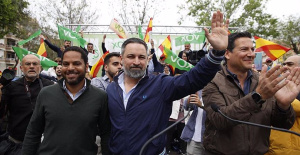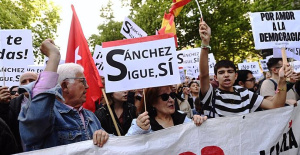The ICRC warns of a "human disaster" due to the fighting in the east between the Army and the M23 rebels
MADRID, 7 Dic. (EUROPA PRESS) -
Around a quarter of the population of the Democratic Republic of the Congo (DRC), which represents 26.4 million people, could need humanitarian aid in 2023 given the deepening of the numerous crises that are shaking the African country, according to what has been indicated by the United Nations Office for the Coordination of Humanitarian Affairs (OCHA).
The agency has indicated that millions of Congolese, mostly residing in the east of the country, will continue next year affected by food insecurity, forced displacement, malnutrition and epidemics, which causes them to lose their livelihoods.
Nearly 4.9 million people have received food aid during the first eleven months of the year, while 1.7 million people in a situation of malnutrition, including thousands of children, have received nutritional support.
"National and international NGOs and UN agencies work hard to provide the most vulnerable with water, medicine, food, sanitation and protection so that they can live with dignity," declared the United Nations humanitarian coordinator for the DRC, Bruno Lemarquis. .
"We must also commit ourselves, as soon as there is an opportunity, in the search for lasting solutions, to work with development and peace actors. It is essential that efforts be combined at the national and international level to avoid conflicts and achieve the return of peace, which is the greatest wish of the affected populations to give the best response to the humanitarian crisis they are facing", he concluded.
For its part, the International Committee of the Red Cross (ICRC) has warned of the "human disaster" caused by the resumption of fighting in October between the Congolese Army and the March 23 Movement (M23) rebel group, which has led to the displacement of thousands of people in the province of North Kivu (east).
"I have returned from Nyiragongo outraged by the human disaster that these months of conflict have caused. Once again it is the civilians who pay the price," said the head of the agency's delegation in the DRC, Rachel Bernhard. "These communities have been uprooted from their land, which is their only livelihood. They urgently need to be able to return to start farming again," she explained.
The territory of Nyiragongo currently hosts more than 177,400 displaced people, according to UN data. Most have taken refuge in the villages of Kibati and Kanyaruchinya, located 50 kilometers from Rutshuru, the epicenter of the fighting.
Francine Twizeye, 33, explains that she has nine children to feed and regrets that "she has to send them to beg in the market and on the roads." "It's hard for me to get enough food," she says. Along these lines, Joséphine Habakurama, 32, maintains that "when there is not enough food, we give our share to the children."
Sifa Rehama, a mother of seven children, lives in a two-meter-square hut covered with plastic. "I have covered my house with plastic. When you are displaced there is no choice. You have to get by with what you have," she says. "My husband, my three small children and I sleep here. The three oldest have to take care of themselves and sleep with neighbors in another camp," she adds.
The ICRC has also indicated that while aid generally reaches Nyiragongo, in Lubero, where there are 98,000 displaced people, humanitarian agencies are finding it difficult to carry out their work due to the fighting and the lack of security guarantees.
The UN estimates that more than 280,000 people have fled their homes since the outbreak of fighting in March 2022, although the head of the ICRC sub-delegation in North Kivu, Anne-Sylvie Linder, pointed out that "the number of displaced increases daily."
"If the fighting does not stop, we are going to face a humanitarian crisis that will be difficult to control. We once again remind all parties to the conflict of their obligation under Humanitarian Law to protect civilians and their property," he stressed.

 Exploring Cardano: Inner Workings and Advantages of this Cryptocurrency
Exploring Cardano: Inner Workings and Advantages of this Cryptocurrency Seville.- Economy.- Innova.- STSA inaugurates its new painting and sealing hangar in San Pablo, for 18 million
Seville.- Economy.- Innova.- STSA inaugurates its new painting and sealing hangar in San Pablo, for 18 million Innova.- More than 300 volunteers join the Andalucía Compromiso Digital network in one month to facilitate access to ICT
Innova.- More than 300 volunteers join the Andalucía Compromiso Digital network in one month to facilitate access to ICT Innova.-AMP.- Ayesa acquires 51% of Sadiel, which will create new technological engineering products and expand markets
Innova.-AMP.- Ayesa acquires 51% of Sadiel, which will create new technological engineering products and expand markets Abascal (Vox) criticizes that Sánchez is "victimizing" himself and calls for elections after his possible resignation
Abascal (Vox) criticizes that Sánchez is "victimizing" himself and calls for elections after his possible resignation Carlos Alcaraz reaches the round of 16 in Madrid without breaking a sweat
Carlos Alcaraz reaches the round of 16 in Madrid without breaking a sweat Some 5,000 people demonstrate in front of Congress for democracy, hours before Sánchez's decision
Some 5,000 people demonstrate in front of Congress for democracy, hours before Sánchez's decision STATEMENT: Intelligent systems used in the construction of the deepest underwater tunnel in China
STATEMENT: Intelligent systems used in the construction of the deepest underwater tunnel in China How Blockchain in being used to shape the future
How Blockchain in being used to shape the future Not just BTC and ETH: Here Are Some More Interesting Coins Worth Focusing on
Not just BTC and ETH: Here Are Some More Interesting Coins Worth Focusing on UPV students build a prototype of a wooden house to move to Equatorial Guinea
UPV students build a prototype of a wooden house to move to Equatorial Guinea The UA opens the call for the Impulso 2024 Awards for the best innovative business initiatives
The UA opens the call for the Impulso 2024 Awards for the best innovative business initiatives ALI, virtual assistant from Alicante, internationally recognized by the OECD
ALI, virtual assistant from Alicante, internationally recognized by the OECD Retrópolis brings the golden age of video games and computing to the UPV
Retrópolis brings the golden age of video games and computing to the UPV A million people demonstrate in France against Macron's pension reform
A million people demonstrate in France against Macron's pension reform Russia launches several missiles against "critical infrastructure" in the city of Zaporizhia
Russia launches several missiles against "critical infrastructure" in the city of Zaporizhia A "procession" remembers the dead of the Calabria shipwreck as bodies continue to wash up on the shore
A "procession" remembers the dead of the Calabria shipwreck as bodies continue to wash up on the shore Prison sentences handed down for three prominent Hong Kong pro-democracy activists
Prison sentences handed down for three prominent Hong Kong pro-democracy activists ETH continues to leave trading platforms, Ethereum balance on exchanges lowest in 3 years
ETH continues to leave trading platforms, Ethereum balance on exchanges lowest in 3 years Investors invest $450 million in Consensys, Ethereum incubator now valued at $7 billion
Investors invest $450 million in Consensys, Ethereum incubator now valued at $7 billion Alchemy Integrates Ethereum L2 Product Starknet to Enhance Web3 Scalability at a Price 100x Lower Than L1 Fees
Alchemy Integrates Ethereum L2 Product Starknet to Enhance Web3 Scalability at a Price 100x Lower Than L1 Fees Mining Report: Bitcoin's Electricity Consumption Declines by 25% in Q1 2022
Mining Report: Bitcoin's Electricity Consumption Declines by 25% in Q1 2022 Oil-to-Bitcoin Mining Firm Crusoe Energy Systems Raised $505 Million
Oil-to-Bitcoin Mining Firm Crusoe Energy Systems Raised $505 Million Microbt reveals the latest Bitcoin mining rigs -- Machines produce up to 126 TH/s with custom 5nm chip design
Microbt reveals the latest Bitcoin mining rigs -- Machines produce up to 126 TH/s with custom 5nm chip design Bitcoin's Mining Difficulty Hits a Lifetime High, With More Than 90% of BTC Supply Issued
Bitcoin's Mining Difficulty Hits a Lifetime High, With More Than 90% of BTC Supply Issued The Biggest Movers are Near, EOS, and RUNE during Friday's Selloff
The Biggest Movers are Near, EOS, and RUNE during Friday's Selloff Global Markets Spooked by a Hawkish Fed and Covid, Stocks and Crypto Gain After Musk Buys Twitter
Global Markets Spooked by a Hawkish Fed and Covid, Stocks and Crypto Gain After Musk Buys Twitter Bitso to offset carbon emissions from the Trading Platform's ERC20, ETH, and BTC Transactions
Bitso to offset carbon emissions from the Trading Platform's ERC20, ETH, and BTC Transactions Draftkings Announces 2022 College Hoops NFT Selection for March Madness
Draftkings Announces 2022 College Hoops NFT Selection for March Madness























